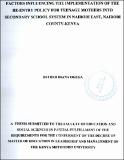| dc.description.abstract | Girl child education is an issue that deserves top priority worldwide. Policies that support on-going access to education are not only important to Kenya as a government but have also been of a major global concern. Many international conventions and treaties have been signed to reinforce the rights of teenage mothers going on with education. These conventions and treaties all recognize education as a human right and point out that each child has a right to education. The re-entry policy in Kenya was pronounced by the Ministry of Education in 1994 to make provision for the re-admission into the mainstream of formal education of teenage mothers who drop out of school due to pregnancy. The researcher used a descriptive survey design to carry out the study. The study targeted 108 secondary schools; of 108 which, 26 were public and 82 were private. A sample of three public and eight private schools were used in the study. The sample size was 472 respondents comprising of 11 principals, 11 teacher-counselors and 450 students. Stratified, Simple random and purposive sampling techniques were used. The study used questionnaires and document analysis for data collection. Piloting of the instruments was done to enable the assessment of validity and reliability of the data collection instrument. The data collected was analyzed using quantitative and qualitative methods, through the aid of SPSS computer software. Qualitative data was analyzed using themes and information coding, while quantitative data was analyzed using descriptive statistics. The findings of the study were presented using frequencies, tables, percentages, and graphs. The study established that there was inadequate awareness and sensitization about the re-entry policy among school principals and the school counselors (teachers) thus affecting its good intention. While high levels of awareness was noted among the students from external sources, it was evident that schools' have low perception on the overall implementation of the policy since they were not effectively playing their role as the primary informers of government policy among students. It was therefore, concluded that guidance and counseling, on gender issues was weak in the schools. The study found out that students had positive perceptions of the policy since it provided those affected with a second chance to pursue their education. The study found out that some of the stereotypes which included negative attitude of the parents, stigma associated with early pregnancy, students' unwillingness to return to the same school after dropping out were factors negatively affecting the implementation of the policy. The study recommends that the Ministry of Education train principals and school counselors (teachers) on the re-entry policy and also ensure that policy guidelines and circulars are available in schools to reinforce awareness raising. In addition, the Ministry of Education and school administrators should strengthen guidance and counselling in schools, especially in dealing with stigmatization and encouraging acceptance of teenage mothers in the schools. | en_US |

